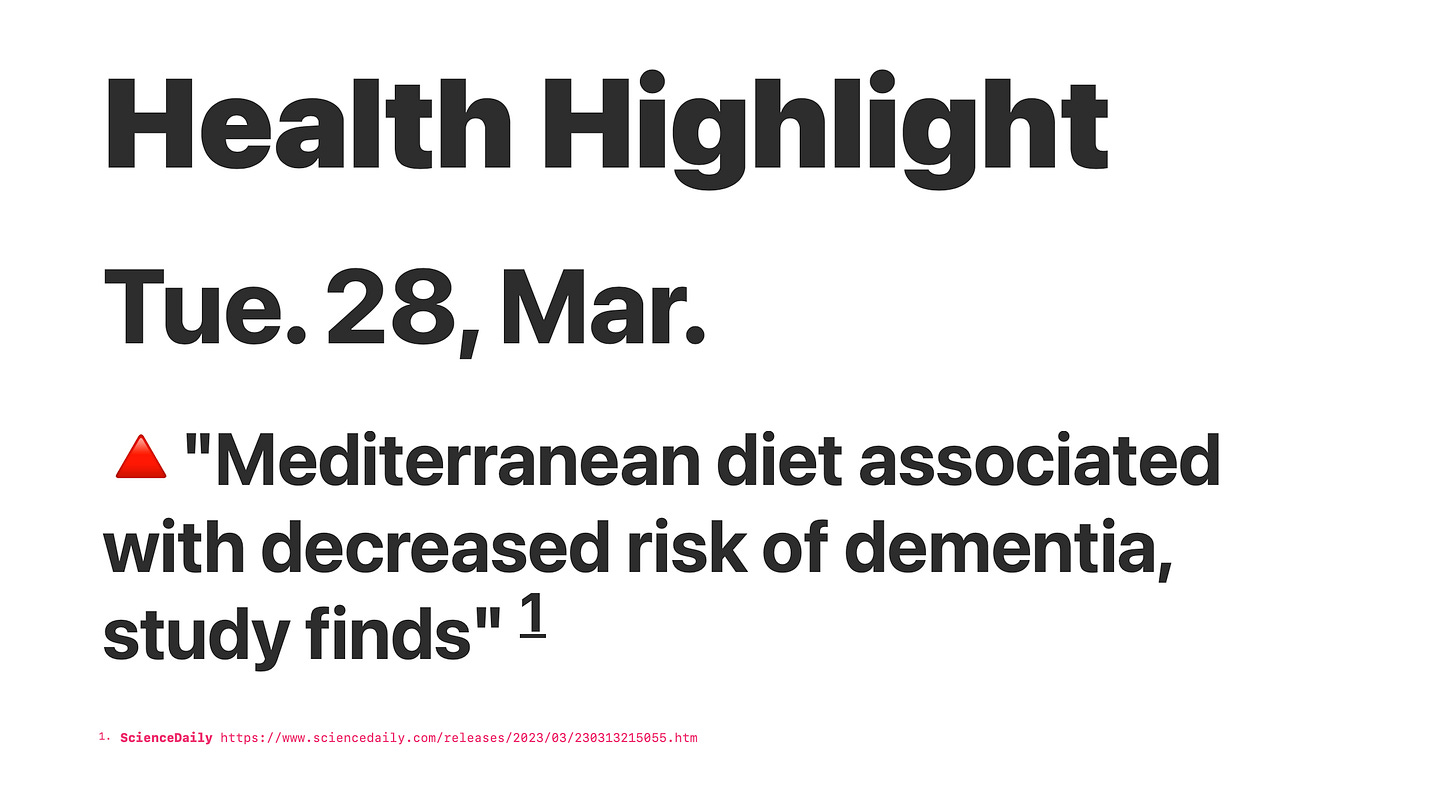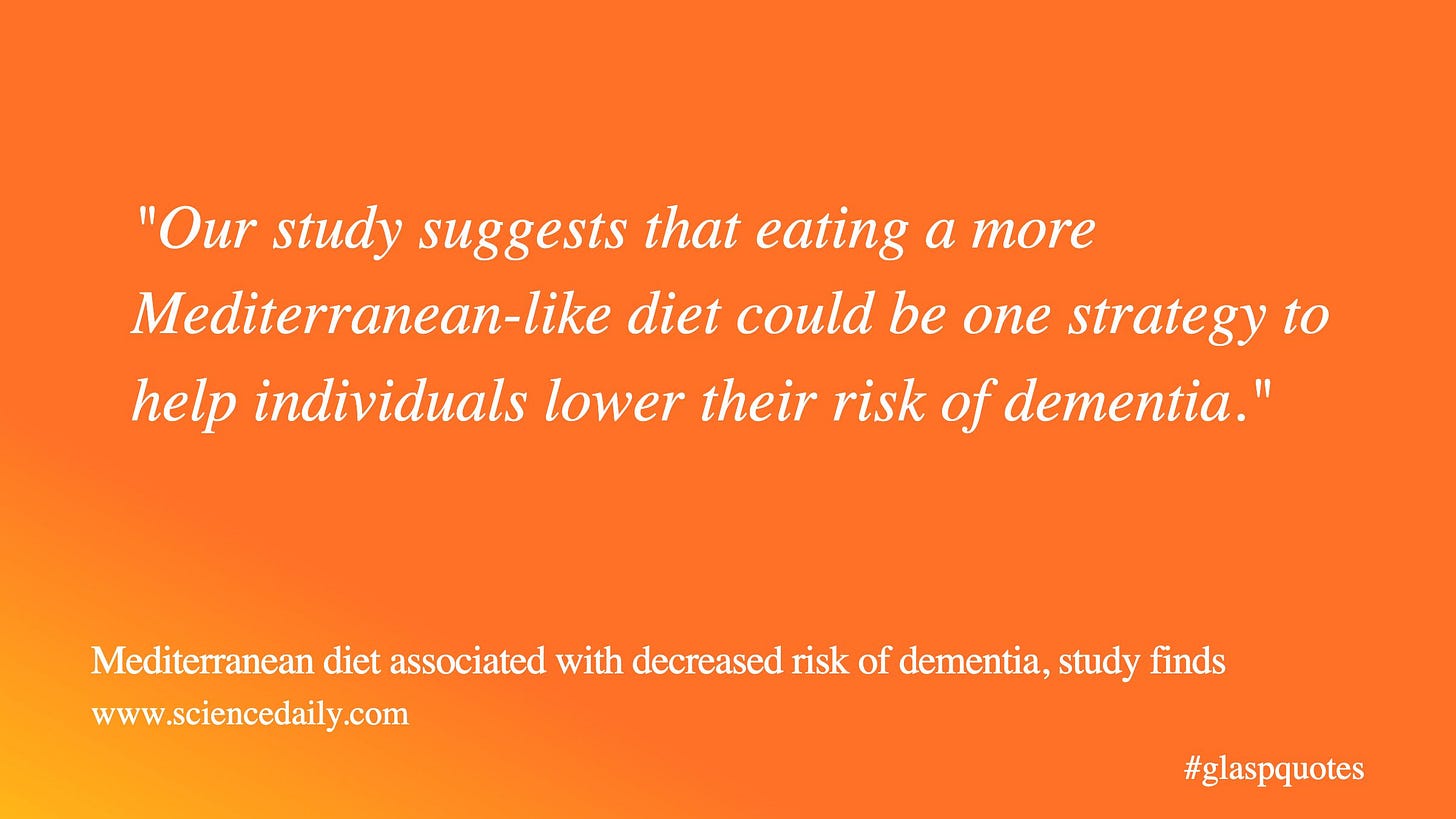Health Highlight: Tue. 28, Mar.
Today’s highlight: Eating a traditional Mediterranean diet helps lower risk of dementia.
Health Highlights workflow is powered by Glasp.co & Neeva
🧠 Learn, ❤️ Like, 🤝 Share, and 📩 Subscribe
“Mediterranean diet associated with decreased risk of dementia, study finds” (URL, Glasp)
✍🏼 ScienceDaily Staff Writer(s) • 🗞️ ScienceDaily • 🗣️ @ScienceDaily
BRIEF
According to a Newcastle University study, a Mediterranean-style diet is associated with a lower risk of dementia. 1 However, there are some caveats.
CONTEXT
The study examined data from 60,298 people in the UK Biobank and observed that those who closely followed a Mediterranean diet had a 23% lower risk of dementia than those who did not. 2
The study is one of the largest of its kind. The authors suggest that a Mediterranean diet, regardless of genetic risk, could be an important protective factor in reducing dementia risk.
But more research with a wider range of people is needed to confirm the possible benefit.
“The authors caution that their analysis is limited to individuals who self-reported their ethnic background as white, British or Irish, as genetic data was only available based on European ancestry, and that further research is needed in a range of populations to determine the potential benefit.”
THE NUTS AND BOLTS
Let’s start out by understanding a few things. Dementia is not a disease; it is a collection of symptoms caused by an underlying disorder, the most common of which is Alzheimer’s disease. 3 This is important to know because the number of people with Alzheimer’s is expected to more than double in the next four decades.
“An estimated 6.7 million Americans age 65 and older are living with Alzheimer’s dementia today. This number could grow to 13.8 million by 2060 barring the development of medical breakthroughs to prevent, slow or cure AD.” 4
The researchers were narrowing in on diet as a modifiable risk factor that could be aimed at both the individual and at-risk demographics as a public health measure to confront this growing problem. 2
“The purpose of this study was to investigate associations between MedDiet adherence and dementia incidence in a large prospective cohort study, and to explore the interaction between diet and genetic risk for dementia.”
The Mediterranean diet is a food consumption profile named after a geographical region that differs from the typical American diet in terms of food portions and types of foods consumed daily. 5 This diet was chosen because previous research showed a connection between eating this way and reductions in cognitive decline. 6
CONCLUSION
The results of this study reinforced findings that sticking to a Mediterranean-like diet helped reduce the risk of dementia, but the connection to genetic risk was not as clear.
“In the present study, we found no significant interaction between polygenic risk for dementia and MedDiet adherence defined by the MEDAS continuous or PYRAMID scores in our primary analyses.” 2
Both the Mediterranean Diet Adherence Screener (MEDAS) and Mediterranean diet Pyramid (PYRAMID) are widely accepted scoring systems used in studies to measure how closely study participants follow the Mediterranean diet.
MORE
The Mediterranean diet and health: a comprehensive overview (PubMed.gov)
Dementia prevention, intervention, and care (The Lancet.com)
🏷️ Tags: #Health #Wellness #MediterraneanDiet #Dementia #Alzheimers
Notes
“Mediterranean diet associated with decreased risk of dementia, study finds” https://www.sciencedaily.com/releases/2023/03/230313215055.htm
“Mediterranean diet adherence is associated with lower dementia risk, independent of genetic predisposition: findings from the UK Biobank prospective cohort study” https://bmcmedicine.biomedcentral.com/articles/10.1186/s12916–023–02772–3#Sec11
“About Dementia” https://www.cdc.gov/aging/dementia/index.html
“2023 Alzheimer’s disease facts and figures” https://alz-journals.onlinelibrary.wiley.com/doi/10.1002/alz.13016
“Mediterranean diet” https://medlineplus.gov/ency/patientinstructions/000110.htm
“The Mediterranean diet and health: a comprehensive overview” https://pubmed.ncbi.nlm.nih.gov/34423871/






